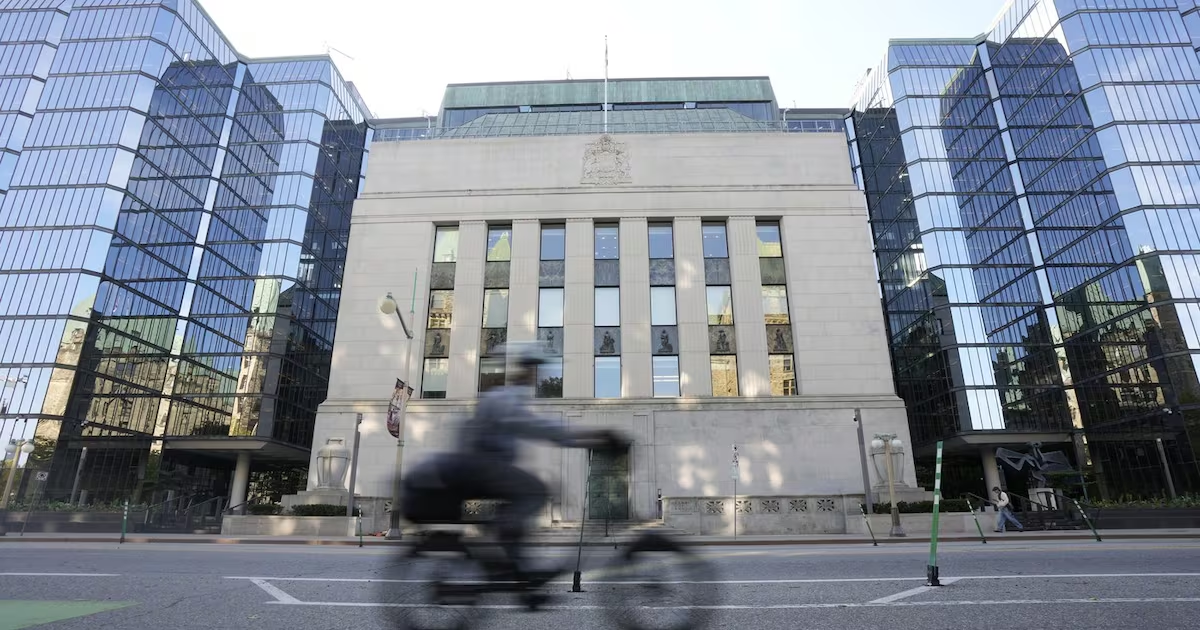Crypto ATM Scams are on the Rise. Here’s What You Need to Know

‘Welcome back to Terms of Service. I’m CNN tech reporter, Clare Duffy. Before we get into today’s really important conversation about a new and growing type of scam, I have a favor to ask. Here at Terms of Service, we’ve been thinking a lot about what AI is going to mean for human work in the future. And I know we’re not alone. I’m especially interested to know how high school students are thinking about this. And how AI is affecting their plans for what to study in college or what to pursue as a career. So if you’re a high school student with your parents’ permission, or if you are a parent of a teen who’d be willing to talk to us about this, please get in touch. Send us a voice note or an email at cnntermsofservice@gmail.com. Okay, now onto today’s episode. If you’ve been in a gas station or a liquor store lately, you may have noticed a yellow machine in a corner that looks like a traditional ATM, but where you can actually exchange cash for cryptocurrency. More and more of these crypto ATMs have popped up as cryptocurrency has gone mainstream. But as the incredible team at CNN’s investigative unit found recently, these machines have also become a prime tool for scammers to seize money from victims. So, how do these scams work? And how can you make sure you and your loved ones avoid them? To answer these questions, I invited Curt Devine into the studio. He’s a producer for CNN Investigates and worked on this story, and he had some wild phone calls with scammers in the process.
So now you can simply go there, go to the cashier, and withdraw your all $10,000.
Okay, but I should probably tell them about the suspicious activity.
‘Sir, you don’t need to tell anything to anybody, sir, because I don’t want — They’re going to freeze your account and you’re going to be in legal trouble.
So we have to do it very calmly, sir.
My conversation with Curt after this short break. Hi Curt, thanks for being here.
Hey, thanks for having me.
For anyone who isn’t familiar, what is a crypto ATM and how do they work?
Yeah, a crypto ATM in some ways is very similar to a regular ATM, at least in appearance and its basic functions. But the key distinction is that you walk up to one of these things, you put in cash and you convert it to cryptocurrency. You select a digital wallet that should be your wallet and then can convert your own into crypto.
And obviously we’re going to be talking about how these machines can be misused, but there are also legitimate uses of these things too, right?
There are. The companies will certainly point out that for anyone who primarily deals with cash and wants to get into crypto, these devices offer a way to do that. And I think it makes sense if you have, say, a little bit of money and you’re curious about cryptocurrency, but perhaps you don’t want to download an app, then you could use one of these things. But I think one big question is given the high fees that these machines often charge, whether it makes sense to use these in light of some of the apps that have proliferated in recent years that make it quite easy to buy cryptocurrency.
And this is maybe a bit wonky, but like my understanding, if you buy crypto on one of these apps or one of this websites sort of like the normal way that maybe most people go about buying crypto, you’ve got an app where you have sort of a digital wallet in the same way that you would have a brokerage account to buy stocks or something like that. If you buy a crypto on of these ATMs, does it also start some kind of like wallet for you where you could in theory like go check your balance and use your crypto or trade your crypto.
The short answer is yes. You select your own digital wallet and put your cryptocurrency there. So in simple terms, yes.
‘Got it. So how are you seeing scammers using crypto ATMs to con victims into giving them money? Sometimes — based on your reporting — their life savings. Walk me through a scenario from the beginning about how this works.
‘Yeah, so these scams start in various ways, but often it’s a scammer reaching out to a victim by email or text or something like that, a pop-up on their computer, which alerts them to some sort of dire problem, like your computer’s been hacked, or you’ve been charged this big bill by a tech support company like the Geek Squad with Best Buy. And so then that gets the target of the scam to say, oh my gosh, I gotta resolve this. And so, then we have seen situations where victims call and are trying to do the conscientious thing to resolve these situations and then the scammers will say, okay now uh yes we are indeed seeing that there has been fraudulent activity on your account quick you have to withdraw all this cash otherwise you’re going to lose it and we have a way for you to keep it secure so now go and put it into this crypto ATM and so the victims will believe, oh great, I’m about to save my cash by getting it out of this hacked account that I have. And lo and behold, they’re actually sending it to the scammer by putting it in the crypto ATM at the wallet address that the scammer has given them. These scammers are pretty sophisticated. At least the systems they’ve developed to do this are really complicated. So one scammer will pose as a low-level tech support worker, and then he will I’m gonna transfer you over to my senior fraud manager because your situation is so dire and then that person will say, Oh, wow, we’re seeing you know illegal purchases from China on your account. And they keep going and the the hole seems to get deeper and deeper, and so they’re inducing more and more fear into the victim.
In another version of this scam that Curt and his team came across, scammers posing as tech support agents will claim you were charged for support services you never wanted and offer to refund you. But then, the scammers pretend to have refunded you for thousands of dollars, more than you were supposedly owed, and claim it will be a crime if you don’t withdraw that amount and send it back via crypto, even though it’s all a farce. So once a victim is convinced to put the cash into the crypto ATM, where does it go? What happens to it?
Yeah, so the scammers will give the victims a digital wallet. So they’ll typically send them a QR code to scan, which is their digital wallet, and then the money goes there. So the victims think, oh, I’m transferring this into some safe account that is specifically secured for me. But no, lo and behold, it’s going to a scammer’s account. And then they can route that money to a number of different digital wallets and circle it around the world and then cash it out on a foreign exchange somewhere.
Curt told me that the victims of crypto ATM scams are disproportionately elderly, but elderly people aren’t the only ones affected.
No demographic is exempt. I mean, I even came across one case in which a victim said that she had worked at the criminal division of the IRS. So this is someone you would think would be well aware of the potential for fraud and even fell for one of these scams. And so elderly people are often the victims, but we’ve come across people who are essentially in every age bracket.
And how much money are people losing?
Right, so on average in the records that we collected, which was about 700 incident reports from police and other consumer complaints, we found that the average victim lost about $16,000.
Wow. Yeah, I mean, it just makes me think about how desperate and how afraid people must feel to take out tens of thousands of dollars in cash and walk into a gas station to put it. I mean that can’t, that has to like take some time to do.
That’s gotta be really scary for people.
Right. It takes, I mean, in some cases, hours for individuals to upload all of the cash to deposit it into these machines. And this is where we actually heard from some store clerks who have begun to witness these scams in action because they see these often older people sitting on tools or chairs. Putting $100 bill after $100 dollar bill into these machines while on the phone with someone and they say something about this seems odd and so some of them have begun to become aware of these scams and our colleague, this is what’s wild, one of our photographer colleagues happened to go into a convenience store and witness, we don’t exactly know what was happening on the phone but he witnessed, just by chance, a store clerk being concerned about this older woman who is putting money into one of these machines and the store clerk was saying, ma’am, effectively I’m paraphrasing, but he was saying don’t do that unless you know what’s happening here. There’s been a lot of scams recently.
She walked out of the building. Our colleague was not able to catch up with her, so we don’t know exactly what was happening there. I mean, it looked a bit like a scam. Certainly what we can say is that that store clerk was very concerned that a scam was happening.
How widespread is this phenomenon?
Right. So the FBI has released some numbers. They said last year that about $250 million had been lost to these types of scams in the U.S. And that there were about 11,000 complaints about specifically crypto ATM type fraud. And then this year, they told us that in the first half of the year, about $240 million had been loss. So that’s, you know, on pace to be about double the pace of last year.
That is bonkers. Do we have any idea who the main perpetrators are? I mean, you sort of touched on this, but do we know who the scammers are on the other end?
Yes and no. I mean, in certain circumstances, prosecutors have charged specific individuals. So there have been some cases in recent years where, for example, some citizens of India were charged for scamming people in the US, and they were actually arrested. One of them actually, according to court papers, fled the country through Istanbul and disappeared. So basically we have these situations where specific individuals are named. And then we also have reports from law enforcement, researchers, even CNN has reported on some of these massive scam compounds in places like Africa and Asia, where you have an entire effectively offices set up to run these scams in mass. And these are complete with call centers where people spend hours upon hours making these calls to potential victims. You have different departments with people who develop the scam software. I mean, these are robust criminal operations.
So your team’s investigation found that scammers aren’t the only ones profiting from these schemes. Talk to me more about what your reporting found on this point.
Right. So we found that these crypto ATM companies also make money by often marking up the price of cryptocurrency by 20 to 30 percent or more on transactions, including the illicit ones. And even as some of the major companies say they offer fee refunds to victims, we spoke to nearly a dozen victims who said they weren’t refunded money. And so I think all this, you know, does add up to a picture in which the companies are profiting from scams even as they they dispute that and say that you know, they they aren’t profiting from scams. They don’t want to and they have protections in place to try to prevent that.
And it sounds like the challenge is when somebody has been scammed like this, they realize it’s a scam, they want to get their money back, either the victim is out that money or the crypto ATM company is out of that money if they then refund it to the victim because the scammers have taken off with it, the money is gone. So somebody’s out the money, right?
Yeah, that’s a very fair point. I think the dichotomy here is that these are multimillion dollar companies, and then you have, you know, often elderly victims depositing, you know, thousands of dollars. And of course, we’ve found situations in which people have put in hundreds of thousands of dollars, so I think to an extent it’s for the courts to decide who should keep that money. The companies have often won these cases when they’ve challenged in court to get that scam cash back that has been seized by police. But we have certainly heard from many victims who say, I don’t think that’s fair. I’m really hurting because I lost, say, $10,000 or $20,000.
Well, and it sounds like the companies, in many cases, are very well aware of the fact that their crypto ATMs can be used for these kinds of scams. Do the companies have any warnings or any fraud prevention efforts in place?
They do absolutely have warnings. And I think to their credit, they post these things on the machines, often on the touchscreens when victims or anyone is using the machine. I think the scammers know this and have ways to coach their victims around this. So the warnings, I think, have limited abilities to stop these scams. The companies do also say they have various other layers of protection, like workers, who are on the clock trying to detect suspicious transactions and block them. They have, you know, other systems in place using blockchain analytics to try to block known scam wallets. But many members of law enforcement we spoke to said these companies could be doing much more like imposing strict daily transaction limits of, say, $1,000 or much more aggressively placing holds on suspicious transactions. And yeah, so this is a lively debate at the moment.
For police, trying to track down scammers to hold them accountable or claw back the money for victims can be tricky, given the anonymity that crypto often provides and the fact that scammers are typically overseas.
So I think local police have limited abilities to actually get the scam currency back from the scammers. And then I think it becomes a question of can they seize this cash from inside the machines, which as I was mentioning, often becomes a legal fight that the crypto ATM companies often win in court.
Yeah, in my sort of like naive brain, I think, well, the cash is still sitting there in the machine, the physical cash is. So why can’t you just take it out and give it back to people? But it sounds like the crypto ATM companies fight very hard to say, no, that cash is ours.
Yeah, and some local law enforcement do go to pretty aggressive measures to take that cash. There was a sheriff’s office in Texas that this past summer actually sawed into one of these machines with a physical power saw, opened the thing up to take a victim’s cash back. And they can do that, and they get search warrants to do this sort of thing. But again, the companies often win in court saying, you know, that’s our cash. These victims have signed our terms of service and agreed not to deposit this currency into someone’s wallet that is not their own. So there are all sorts of reasons why these companies win in court, but again, the local departments often just have limited abilities to help victims.
‘Mm-hmm. And why does cryptocurrency work so well for this type of scam? Like, to your point, obviously scammers are trying to take money from people in all kinds of ways. But why has this crypto scam been so successful?
I think it works well because once you put that cash into this machine almost instantaneously, it can be converted into cryptocurrency and then routed to many different digital wallets bundled and flipped around and put into a foreign cryptocurrency exchange, many of which either do not comply with law enforcement or are less likely to respond to say subpoenas from U.S. police. And so it’s just one of those effective means as compared to, say, trying to get your victim to buy a bunch of gift cards to send to you or trying to get them to route you money directly through a bank.
So once someone has put cash into one of these crypto ATMs, it’s very difficult to get it back. After the break, you’ll hear part of a conversation Curt’s team had with one of the scammers. And we’ll also hear Curt’s thoughts on what could be done to stop this. We’ll be right back. So you and your colleagues had some pretty remarkable conversations with these scammers, where in some cases they kind of admit what they’re doing. Tell me more about those conversations and what you took away from that.
Right, so when I called one of these individuals and went through this whole scam process, he was keen on getting me to withdraw a bunch of money from my bank account and at one point realized that I was not going to do that. I was trying to suggest that I had actually withdrawn this money and had taken a photo on my phone of some cash because he wanted to basically verify that I had cash in front of me. He spotted that that was not a real photo and then became very, very upset with me.
I think I have a better photo now. I was able to put the money on this table.
You asshole, you asshole, you piece of a sh**. You’re taking this picture on your phone.
It’s because I’m scared right now. I don’t know what to put this money down.
You asshole f***ing whore, dumb mother f***er
Our colleague Kyung Lah, she went through another one of these situations and got to the point of withdrawing cash. She actually really committed to the scam, took out thousands of dollars, showed it to the scammers. He said, okay, it looks good. Now go to this crypto ATM and put it in the machine. And then I was sitting right next to her at the time and we decided, okay. You know what? We’re not going to obviously put this money into the machine. Let’s go ahead and just start grilling this scammer with questions. So she started asking him, you know, where are you based? Why do you do this? How much money are you scamming? And what was fascinating is for the first few questions, he tried to maintain the cover story, but then eventually he seemed to drop it. And when she asked how much money, are you and your colleagues scamming, he seemed to boast and he was like, you know, we’re transferring millions of dollars a month in cryptocurrency. And then she asked him, do you care about the people that you’re scamming out of their life savings, and he seemingly apologized. I mean, he said, I’m sorry about that, but then hung up. And so, you know, it’s very hard to know who these individuals are in these exact circumstances and what they are feeling. I mean, it brings up another point that a lot of these individuals are themselves victims of trafficking. This is what we spoke to a member of the FBI who investigated these cases and she said they’ve seen a great uptick in situations of forced labor involving the scammers themselves.
Yeah, that conversation was wild to listen to, where he sort of sounds like, you know, this is my job. Sorry. But fascinating just the way that folks will admit to what they’re doing. Part of the appeal of cryptocurrency is sort of the relative lack of regulation around it and how it kind of sits outside of the traditional financial system. Even if regulators wanted to, is there legislation that they could put in place that would prevent these kinds of scams? Are people working on this?
Absolutely. So states have become pretty active on this. So about 18 states have passed laws or rules specifically on crypto ATMs and scams. This gets into a whole other piece of this involving the crypto ATM companies where these companies have hired quite a number of lobbyists to push this legislation more in their favor. So some of these rules do things like impose daily transaction limits, impose certain refund requirements, and the companies have played a role negotiating those. But I mean, we did find that in certain places, the legislation was rather watered down where those daily transaction limits were raised after the crypto ATM lobbyists got involved. And, you know, certainly private companies have every right to do that. I think just the scale of the lobbying and its effectiveness is rather striking in light of the amount of scams that we’re seeing across the country.
Based on your team’s reporting, how do you suggest that people avoid becoming victims of this kind of scam?
Yeah, I think, I mean, number one, just being aware of the prominence of scams. I think we’ve all received those, you know, text messages or emails from people we don’t know where they’re coming from and where they are and they say you owe money. I think obviously just being highly skeptical of those. But I think it’s fair to say in any circumstance, if some certain individual posing as a member of authority, either working for law enforcement or a major company says, you owe money, and you must pay it now, and you must do it through a crypto ATM. That is almost assuredly a scam.
Yeah, yeah, it’s a piece of sort of advice that’s come up in a number of different conversations we’ve had for the show, which is like, go and verify that another way, if it’s Best Buy calling, hang up the phone and call Best Buy. If it’s your bank, do the same thing. But I think your point about just being aware that this is happening is huge. Do you think that people should steer clear of cryptocurrency ATMs entirely?
I mean, I think that’s an individual question. I think the main thing to be aware of is that these companies do charge often what would be considered high fees of 20 to 30 percent or more. And so I do think it begs the question, you know, in this age when you can download an app and do all of this electronically for fewer fees or markups. Why you would use one of these machines. But some people may say, hey, I have a lot of cash and I want to get into crypto. And so I choose to do it that way. There have been some individuals who are highly skeptical of these machine, certain state lawmakers who have said, I see no other purpose for them other than illicit activity. So we should just outright ban them. I think a lot, you know, a lot people are skeptical of that because they say, well, you people can spend their money how they want. But I think being aware of those fees is probably important for anyone who’s considering using one of these machines.
Well, Curt, thank you so much for doing this. This is so important for people to be aware of.
Awesome, thanks so much for having me.
‘Like Curt mentioned, it’s worth thinking twice before using an ATM to convert cash into crypto. There are apps that do this without the hefty fees. But overall, this story brings me back to something that comes up a lot on this show. If you get a random call, email, or text message that seems urgent and is demanding something of you, slow down. Consider the fact that scams are rampant at the moment and try to verify the information you’re getting before acting. Often the FBI will post warnings online about common scams, so ask the person on the other end of the line to hold on for a moment while you do a quick Google search. And if there are people in your life who may never have heard of a crypto ATM before or might be more susceptible to something like this, mention it to them. Maybe even play them this episode so they can avoid getting duped. We’ll also link to Curt and his team’s investigation in the show notes. And before we go, a reminder that we’re looking for high school students to tell us about how developments in AI are affecting their decisions about what to study in college or what career to pursue. If you’re a high school student with your parents’ permission or a parent of a teen who’d be willing to talk with us about this, please get in touch. Send us a voice note or email at cnntermsofservice@gmail.com. That’s it for this week’s episode of Terms of Service. I’m Clare Duffy. Talk to you next week.





